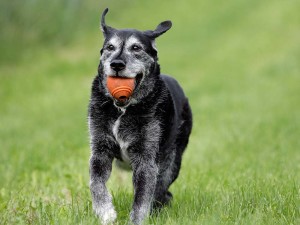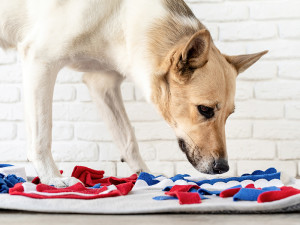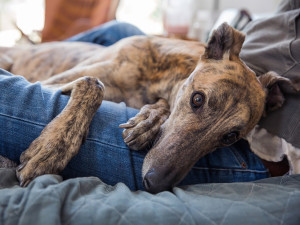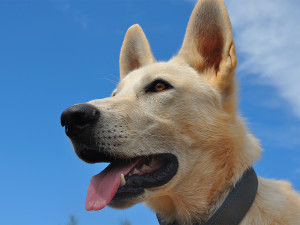How to Take Care of a Senior Dog
As dogs age, it’s important to recognize both physical and mental changes they may be experiencing.
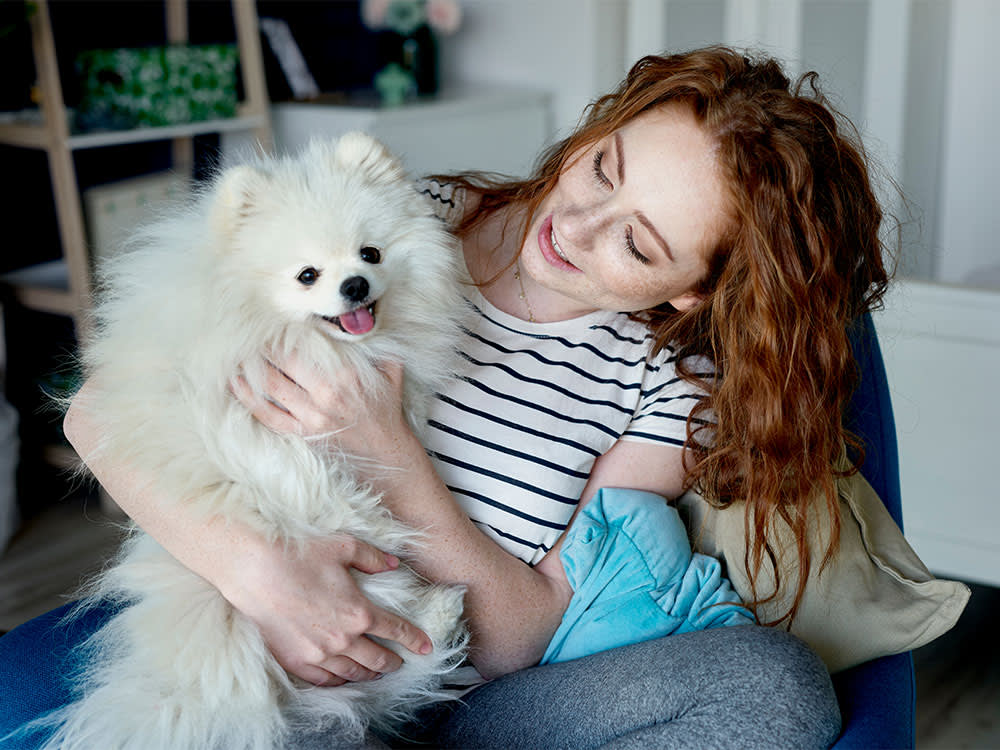
share article

Your pet wants you to read our newsletter. (Then give them a treat.)
As our BFFs age, they may go through more than just a gray hair phase. Despite the additional health concerns that come with aging, senior dogs still make wonderful companions full of love, playfulness, and energy — they just might need a little extra care and attention.
Harmony Peraza, a Texas A&M College of Veterinary Medicine & Biomedical Sciences’ Dog Aging Project veterinary technician, looks beyond the graying muzzle to share a few tips on caring for senior dogs and insights on the most common health conditions that may arise as our pups get older.
Signs of Aging in Dogs
While there is some variation among breeds, a dog is typically considered a senior at eight years old. Large dogs may show signs of aging faster, becoming seniors as early as six or seven, while smaller dogs may not start showing signs of age until they are nine or ten.
Physical Changes
Stiff joints, joint pain
Decreased mobility
Less energy and stamina
Reduced hearing and vision
Changes in appetite
Weight gain
Dental disease
Increase or changes in urination
Behavioral changes
Increased anxiousness
Less active or interested in play
Changes in sleep patterns
Increased irritability
Loss of previously learned skills
Cognitive decline
Increased dependence or clinginess
Caring for Senior Dogs
Even though dogs may develop health conditions as they age, they can still make great pets and live well past the point of becoming seniors. Throughout their lives, dogs are experts at showing unconditional love and acceptance for their pet parents. Once dogs have moved into their senior years, pet parents can return that love by helping them stay comfortable, happy, and healthy.
Joint Health
One of the most common concerns in senior dogs is arthritisopens in a new tab, which can cause a dog to move stiffly and slowly and sometimes also gain weight because of decreased activity. Two easy ways to care for your senior dog and help them stay comfortable are to provide them a soft surface to layopens in a new tab on and reduce their exposure to the elements.
“I also recommend reaching out to your dog’s veterinarian for suggestions of supplements and, in some cases, medications that can potentially help with the discomfort of arthritis,” Peraza says. “Aging doesn’t have to be painful for your dog.”
Vision and Hearing
Many dogs also lose their hearing and vision as they age, but this does not mean that they can no longer live a full and happy life. “If you notice that your older dog seems withdrawn, is sleeping deeper than usual, doesn’t come to you as readily when called, or seems lost and confused, these can be signs that they have lost some vision or hearing ability,” Peraza says.
Blind and deafopens in a new tab dogs are great at finding new ways to navigate and stay active, but they do need more patience and understanding from their people.“Even dogs that go blind can manage to get along very well,” Peraza says. “It is recommended to keep furniture or objects in the home and yard in familiar order for the dog. Rearrangement of items can be confusing and cause the dog to bump into the newly arranged items.”
Disease Prevention
Dogs have an increased risk for canceropens in a new tab as they age, as well as “wear” on important organs like the heart and kidneys. If a senior dog has increased panting, decreased activity, vomiting, diarrhea, or a change in appetite, thirst, or the frequency of urination, it should be seen by a veterinarian, as these can be symptoms of heart and kidney problems. Pet parents can help prevent heart and kidney problems in senior dogs by keeping up with oral hygiene.
“A red gum line and tartar buildup on a dog’s teeth indicate bacteria or infection within the mouth,” Peraza says. “Bacteria is shed into the bloodstream and directly affects the health of the pet’s heart and kidneys. Dental diseaseopens in a new tab is much more than just smelly breath and yucky looking teeth.”
Diet
Pet parents can also help older dogs stay more youthful by making small changes to their diet and activity to better suit their aging bodies. Diet changes for a senior dog may be recommended by a veterinarian to treat certain health conditions, encourage weight loss, or help maintain an ideal weight. “Often, an older dog does not need to consume the same number of caloriesopens in a new tab as a younger dog,” Peraza says. “This can be accomplished by simply feeding less or moving to a lighter or low-calorie food.”
Mental Health
Beyond physical changes, a senior dog’s behavior may change, with some even developing dementiaopens in a new tab (or Alzheimer’sopens in a new tab), causing them to act withdrawn or confused. “Keeping a dog engaged through play and training activities may help keep their brain healthy and sharp,” Peraza says. “Additionally, your veterinarian can recommend special foods and supplements that, in some cases, may help delay or minimize the onset of senility.”
It may be common to find an older dog napping, but a dog that suddenly becomes less active should be evaluated by a veterinarian. While some laziness is expected from a dog that has lived a long, active life, excessive sedentary behavior could indicate health problems.
Training
When considering caring for a senior dog, think beyond healthopens in a new tab. Training is important too. While the adage may be that “you can’t teach an old dog new tricks,” senior dogs can usually do anything that younger dogs can do, as long as they have some patience and help from their pet parents. “Old dogs can learn new tricks! In fact, older dogs may be easier to teach,” Peraza says. “They likely have a longer attention span and more focus than a young puppy. Additionally, teaching your older dog new things can help to keep their mind sharp and slow the signs of senility.”
Exercise
Older dogs may need fewer calories, but this doesn’t mean that they should live a sedentary life. If vigorous exercises like running or jumping have become too difficult for a senior dog, they can still benefit from walkingopens in a new tab, jogging, swimming, or playing. “Offer a comfortable, cool place for your pup to rest,” Peraza says. “A little patience, understanding, and a gentle hand can go very far with older dogs.”
Common Health Issues with Senior Dogs
Just as with younger dogs, regular trips to the veterinarian are essential for caring for your senior dog. Peraza recommends taking old dogs to the veterinarian for exams and lab work every six to 12 months and keeping up with fleaopens in a new tab, tickopens in a new tab, heartwormopens in a new tab, and intestinal parasite opens in a new tabcontrol. “Having your dog’s health regularly monitored can lead to early discovery of problems, and early discovery of problems can increase the likelihood of a positive outcome,” Peraza says.
Caring for senior dogs also includes grooming. “Regular baths and grooming are a great way to not only keep your dog clean, but also provide an opportunity to give a nice little massage to your aging family member,” Peraza says. While you’re massagingopens in a new tab them, do a DIY physical examopens in a new tab and keep an eye out for signs of aging, which could be symptoms of common health issues such as:
Arthritis
Dental problems
Cancer
Kidney disease
Liver disease
Heart disease
Incontinence
Hearing loss
Vision loss
FAQ
How to make an old dog happy?
The easiest way for pet parents to make an old dog happy is to give a senior dog the loveopens in a new tab, attention, and comfort they deserve.
What to expect with an aging dog?
As dogs age, they may have less acute senses and stiff jointsopens in a new tab, and some may develop dementia. Engaging in low-impact activities can improve their health and happiness.
How to entertain an old dog?
Keep your old dog entertainedopens in a new tab with interactive toys, trick training, nosework, enrichment puzzles, and plenty of physical exercise such as swimming, walks, and games.
How to take care of an old dog?
When caring for senior dogs, provide them regular low-impact exercise, a balanced diet, routine vet checkupsopens in a new tab, and lots of mental stimulationopens in a new tab to keep them happy and healthy.
How much exercise is too much for a senior dog?
How much exercise is considered too much depends on your senior dog’s physical limitations. Generally speaking, limit them to 30 to 60 minutes of low-impactopens in a new tab daily exercise.
How to train an older dog?
To train an older dog, be patient, use positive reinforcement, and adjust trick trainingopens in a new tab methods to their physical limitations and individual needs.
Researching Dogs Aging
Dogs spend their entire lives loving us, so it is the least we can do to make sure they stay just as loved until the end. “We all want to help our companion dogs live long and well,” Dr. Kate Creevy, CVM associate professor, says. “To accomplish this, a better understanding of the aging process in dogs is needed. The Dog Aging Projectopens in a new tab brings together a community of dogs, owners, veterinarians, researchers, and volunteers to advance this understanding.”
This project seeks to understand how genes, lifestyle, and environment influence lifespan and health span, the period of life spent free from disease. It will enroll 10,000 companion dogs and their pet parents from across the U.S.
References
AAHA Senior Care Guidelines for Dogs and Catsopens in a new tab
Evaluation of cognitive function in the Dog Aging Projectopens in a new tab
Age and Physical Activity Levels in Companion Dogsopens in a new tab
Once-daily feeding is associated with better health in companion dogsopens in a new tab
How to Care for a Deaf Dog (Texas A&M University)opens in a new tab
Teaching an old dog new tricks (Texas A&M University)opens in a new tab

Jennifer Gauntt
Jennifer Gauntt, MA, is the communications director at Texas A&M University College of Veterinary Medicine & Biomedical Sciences, where she covers scientific advancements in pet heath and behavior. This story was originally published by Pet Talk, a service of the College of Veterinary Medicine & Biomedical Sciences, Texas A&M University. Original stories can be viewed on the web at vetmed.tamu.edu/news/pet-talkopens in a new tab. May be edited for style and length.
Related articles
![A woman hugging her dog.]() opens in a new tab
opens in a new tabWant Your Dog to Live Longer?
Seriously, though. The Dog Aging Project is looking for participants.
![Dogs gathered in the backyard celebrating first birthday. Unrecognizable owner holding a birthday cake with a candle.]() opens in a new tab
opens in a new tabHow to Calculate Your Dog’s Age in Human Years
A new way to convert dog years to human years.
![Close-up of a Merle coated Greyhound dog laying in the lap of their pet parent on the bed]() opens in a new tab
opens in a new tabHow to Give Relief to Your Dog With a Chronic Condition
What are the best ways to manage a dog’s pain?
![golden retriever dog looks out window]() opens in a new tab
opens in a new tabCancer in Dogs: A Primer on Canine Cancers
The word cancer can set alarm bells, turn down the volume by brushing up on cancer basics.
![Happy dog with teeth visible, blue sky background]() opens in a new tab
opens in a new tabDoes Your Dog Need a Dentist?
NYC’s top veterinary dentist on bad breath, dental disease, and brushing your dog’s teeth...daily.
